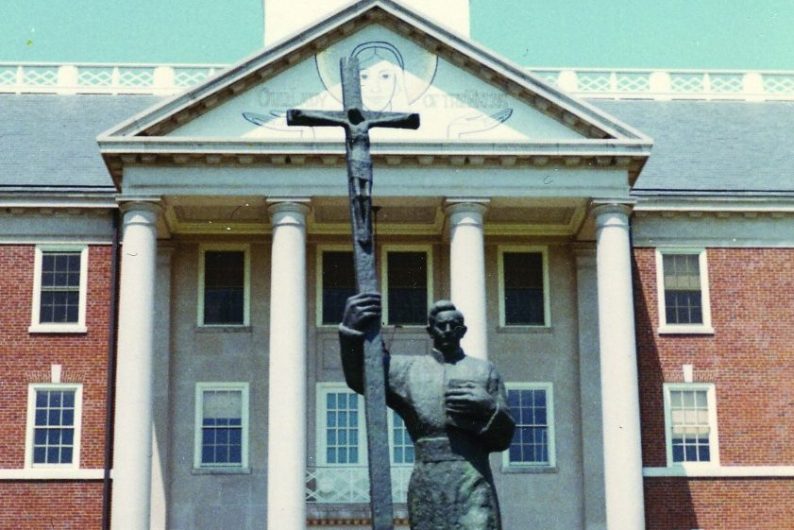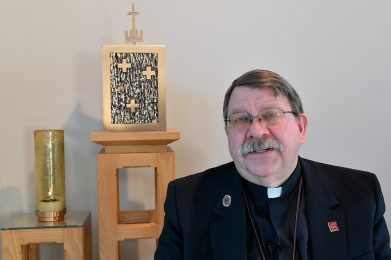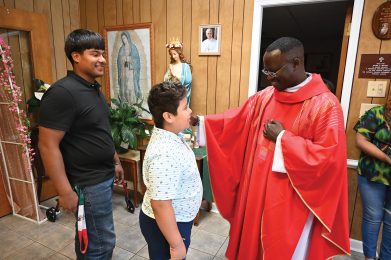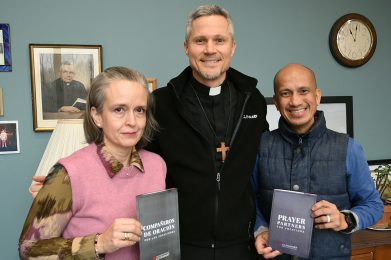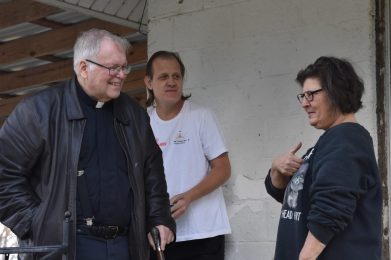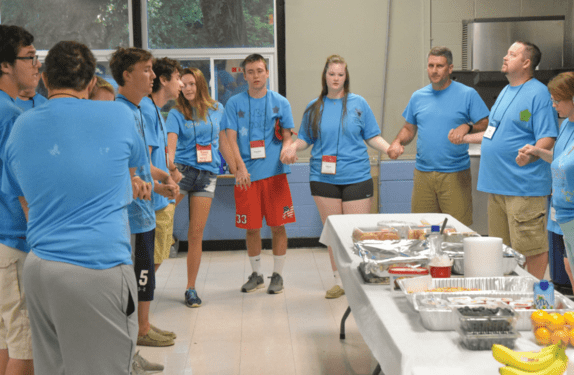Times and people have changed, Father Dan Dorsey says, but Glenmary’s mission remains the same: to cross cultures and bring good news.
What will Glenmary look like at 100? On its 85th anniversary this year, Glenmary President Father Dan Dorsey would rephrase that question: “What will the Catholic Church in rural America look like? And to that, I would say it will be alive—lay ministers, Sisters, Brothers, and priests will be serving and ministering in what our founder spoke of as ‘the forgotten and neglected regions of the United States.’ It’s impossible to predict details of the future. What is crucial for us is to continue to listen to and be guided by the Holy Spirit!”
Not long ago, Father Dan sat for an interview about Glenmary’s future. The Glenmary society is, after all, in a moment of tremendous change, as its oldest, earliest members are becoming fewer, and current leadership is looking forward. Glenmary is surging with new members, men from Kenya, Uganda, Mexico, Vietnam, and, of course, several from the United States. Glenmary now has 13 men in formation and five more entering the novitiate on July 1.
In addition, there are others working in Glenmary missions, that is, lay evangelists and co-missioners from the US, the Philippines, and a priest on loan from India.
In 85 years the Glenmary family has founded 76 parishes, helped develop 88 others, aided thousands of people in need in many ways, and provided national leadership on key areas of the Church’s mission. But Glenmary, the Church, and the world, are changing. That was the topic of our talk with Father Dan, who by the end of his term, will be the longest-serving Glenmary president ever.
Q: How has Glenmary’s mission changed over these 85 years?
A: Back in the 1930s our founder, Father William Howard Bishop, was a man of his times. The missiology [understanding of mission] was reflective of his day and time. Reflective of this, Father Bishop created a map of the United States that highlighted all of the counties where there was not a Catholic priest: No Priest Land, USA. Father Bishop’s vision and his charism lacked an adequate understanding of the complexity of culture and the role culture would play in any mission effort.
Toward the end of his life Father Bishop was beginning to see the importance of culture as he was coming to terms with few converts.
Q: How do cultural differences continue to play out today for Glenmary?
A: A very good example of that is, beginning early in the 2000s, we began to accept men into our formation program whose country of origin was outside of the United States. In the past decade or so we’ve accepted men whose country of origin is Kenya, Uganda, Mexico, and Vietnam. These men, after completing six years of formation in Glenmary, are assigned to our mission areas.
Q: How has that worked out?
A: I must say I’ve been extremely, and I would underline extremely, impressed by the men whose country of origin is not the United States, how effective they have been as missioners. As we celebrate 85 years, I, personally, as a leader, am optimistic and excited about our future.
Q: So, will the direction of Glenmary change?
A: One of the real challenges of Glenmary and for myself is to recognize that our charism, the call to go to these areas, is organic. Glenmary’s charism is “to build up the body of Christ” in the rural areas of the United States. The heart of our charism will never change. How we go about doing that—for instance the difference between 1974 and 2024—will adapt and change over the years.
Q: Cultural differences have been an issue for Glenmary before that, haven’t they?
A: In a sense, Glenmary has been crossing cultures from the outset. For instance, I am originally from St. Louis, Missouri. That’s a different culture from Appalachia, which in turn is a different culture than the Deep South.
Because our skin color is the same or maybe because we’re from the same country doesn’t mean I can fully understand or really appreciate the culture of somebody in Appalachia or somebody in the Deep South.
And so whether they’re black, white, or brown, we really embrace the fact that we will never fully understand the culture. We constantly adapt and learn. As someone once pointed out: We are invited to walk in another culture’s garden. And so we are there to live with and to be a part of the people, as Pope Francis stated in Joy of the Gospel, we should “smell like the sheep.”
Whether you’re from St. Louis, Missouri, or from Nairobi, Kenya, our call, our mission, is the same.
Q: A lot of new things are always happening here. Lately there has been a lot of talk about lay evangelists. What’s that about?
A: Our vision and dream would be that over the next 10 years, we would invite more lay people to be engaged in evangelization. In 2034 Glenmary would have 20 or 30 lay evangelizers living in various counties that we serve and whose primary focus is to be an evangelizer.
Q: What do they do?
A: That’s a great question—I don’t know the answer to that! [laughs] Seriously, though, one of the things that a number of our Glenmary men have done very, very well is best described as a ministry of presence. For instance: You go and you sit in the McDonald’s or a diner for an hour or two every morning, and you meet the people. You go to different events. You get involved in civic and ecumenical events. And through that, . . . people come to know who you are.
When you talk to people, it’s not like you’re trying to impose what you believe or what you think upon them. The most powerful preaching is your love. If you love those you encounter, it will change hearts. It’s going to convert people—people who may have this stereotype of Catholicism and of what Catholics believe in and who they are.
One of the things that all of us find difficult is when our hearts are in conflict. Someone might think, I think this is what Catholics believe and who they are, but why is this woman/man, why are they so kind and loving? Why are they not judgmental? Why is the Catholic Church in town the church where everybody is welcome? Why is this?
The seed is planted, which I believe is the kingdom of God.
It may not mean anything to the world, but it’s a powerful witness to go into places and work with people. As our society’s constitution states at the very beginning: “For the love of Christ impels us” (2 Cor 5:14). Eighty-five years later, it’s powerful to do these things that are very clearly within the tradition and charism given to Father William Howard Bishop. His own words were, “the lost or the forgotten or the neglected.” They look a little bit different today than back then. The issues may be different, but still, the people we serve are the lost, the forgotten, and the neglected.

